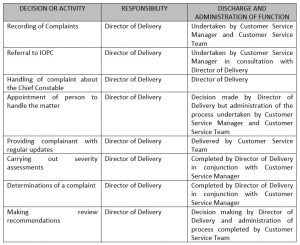News
Search
Other categories
Search
Scheme of Delegation Relating to Complaints
Overview
Under the terms of the Policing and Crime Act 2017 the Police, Fire and Crime Commissioner is the appropriate authority for complaints made against the Chief Constable. There are a number of decisions that must be made in relation to the complaints process.
In addition the PFCC also has responsibility to undertake reviews of complaints relating to less serious matters, concerning officers below the rank of Chief Constable where the complaint has not been resolved to the satisfaction of the complainant and they have exercised their right of appeal.
In accordance with the Policing and Crime Act 2017, section 23, the PFCC can delegate any of the functions of the Local Policing Body contained within the Act.
A summary of these decisions are:
- Recording of complaints
- Referral to the Independent Office for Police Conduct (IOPC)
- Decisions about how to handle a complaint against the Chief Constable
- Appointment of a person to handle the matter
- Responsibility to provide the complainant with regular updates
- Carrying out severity assessments
- Determinations of a complaint
- Making Review Recommendations
These decision making powers are delegated by the PFCC for Northamptonshire to the Monitoring Officer for the Office of Police, Fire and Crime Commissioner.
The Monitoring Officer further delegates these, along with an agreed process for their discharge to ensure the timely and effective management of these processes.
Internal process
The Office of the Police, Fire and Crime Commissioner has an internal process that describes how these delegated responsibilities are administered and discharged.
This is articulated in the table below.

Terminology and Explanation
The following provides a brief explanation of the requirements of each of the decisions or activities above
Recording Complaints
There is a requirement to make a decision about whether a submitted complaint relates to the Chief Constable themselves and if so, whether it requires to be informally logged or recorded under Schedule 3 of The Police Reform Act 2012
Referral to the Independent Office for Police Conduct
All complaints relating to the conduct of a Chief Constable that could, if proven amount to misconduct (written warning / final writing warning / reduction in rank / dismissal), or justify the bringing of criminal proceedings, should be referred to the IOPC.
Decisions about how to handle a complaint against the Chief Constable
The IOPC Statutory guidance sets out that a complaint must be investigated if the appropriate authority determines that the conduct complained about could justify the bringing of disciplinary or misconduct proceedings.
Appointment of a person to handle the matter
The IOPC Statutory Guidance sets out a requirement for the appropriate authority to appoint a person to handle the matter.
Responsibility to provide the complainant with regular updates
The IOPC Statutory Guidance sets out a requirement for the appropriate authority to provide the complainant with regular updates.
Carrying out severity assessments
The IOPC Statutory Guidance sets out the complaints assessed as being so serious that, if proven, the bringing of criminal or misconduct proceedings could be justified, a severity assessment should be carried out. This will determine whether, according to the information available, the conduct would amount to misconduct or gross misconduct.
Determinations of a complaint
According to the IOPC Statutory Guidance, the outcome of a complaint should include a determination of whether:
- The service provided by the police was acceptable
- The service provided by the police was not acceptable, or
- We have looked into the complaint, but have not been able to determine if the service provided was acceptable
If the complaint was subject to special procedures, the outcome of the complaint should also include a determination regarding whether the matter should be referred to:
- Reflective Practice Review Process
- Unsatisfactory Performance Procedures
- Misconduct Proceedings
- Criminal Proceedings
Making Review Recommendations
As the relevant review body for less serious complaints the PFCC is responsible for conducting complaint reviews and making recommendations to the Force.